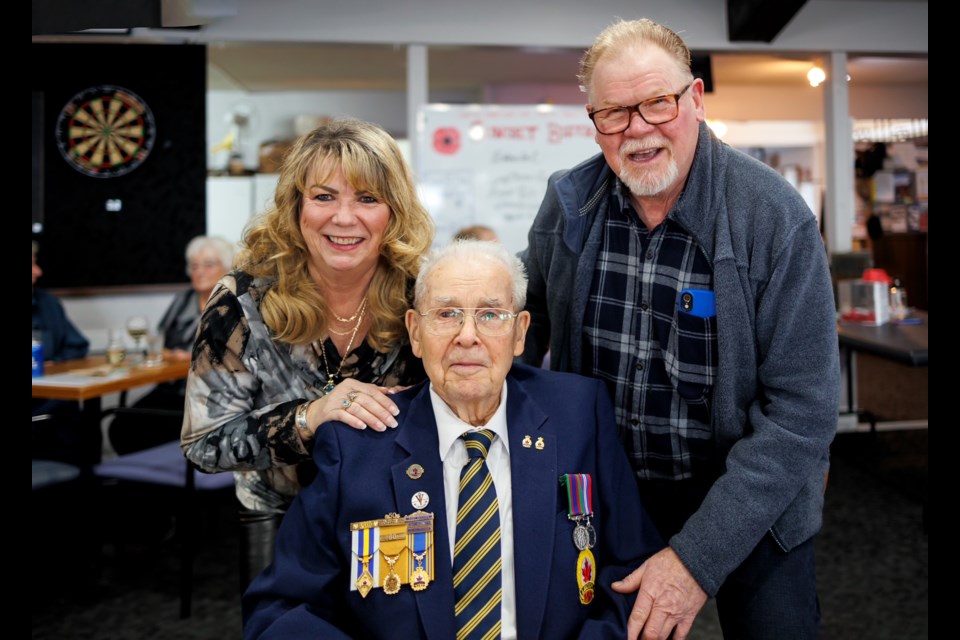Charles Sparks, or Chuck, as he’s known by, was recently recognized with a medal of honour for being a member of Royal Canadian Legion for 60 years.
His service to the community was commemorated at a gathering and ceremony at the Powell River Legion (Branch 164) on February 4.
Sparks understands the value of friendship and community, especially looking out for those in need, and hasn’t stopped trying to help and care for others, even at 96 years old.
“Luck has a lot to do with my long life,” he said.
Luck has followed Sparks throughout his life, indeed. At the age of 17, he left his home in Ontario and made his way to Vancouver to look for work.
“I went to the wrong employment agency and this logger wanted me to work in the bush, and I said no!” laughed Sparks, who decided to join the army instead, as he had just turned 18.
He was sent to Alberta for basic training, where groups of men were quickly trained and sent to fight overseas, to assist the allies fight against Germany and Japan, during World War II.
Sparks wasn’t trained as an ordinary soldier; he volunteered to be a part of the Canadian Parachute Battalion, or airborne infantry. “The training was intense and required going on five-,10- and 20-mile marches,” said Sparks. “With army boots on and a full load of gear.”
The men were training to survive and thrive in potentially harsh and life-threatening situations in Europe and the South Pacific.
Parachuting out of planes was also expected, and Sparks did that, too. Many platoons before him were sent off to war, and many did not return.
As luck would have it, his platoon, which was gearing up to be sent overseas, was held back. Japan had surrendered. Sparks “knocked around the province of BC for a while and through a friend got some marine training.”
Being young, smart and adventurous, he eventually ended up in Vancouver.
In those days (late 1940s and 1950s), Vancouver was a rough and tumble town, full of loggers, off duty sailors and people looking for any work, if they could get it.
Sparks said he was offered a job on a ship that sailed all the way from Skagit in Washington State up to Nootka Sound, delivering goods to remote communities. “We would also take back canned salmon from one of the many canneries that were running at the time,” he added.
After two years sailing, he received more training in engineering and army maintenance and travelled to the Yukon to repair army vehicles along the Alaska Highway.
“I travelled about 900 miles on that highway, fixing diesel engines for the army; I was trained as a journeyman,” said Sparks.
“The highway was built in 1948 and it was still a dirt road.” That’s where he met his future wife, Enid, and they decided to get married elsewhere.
Sparks said he thought if they didn’t leave the Yukon then, they would never get out. “The Yukon back then was difficult living, and once the snow hit, you were stuck,” he added.
Enid was from Powell River and so they moved to the coast in 1950. Sparks found a job at the mill, and stayed for 38 years. “Powell River was a rich resource town, with most people working in logging and fishing,” he said.
For 13 years he was a volunteer fireman in Cranberry and “quite active” in the neighbourhood. Of course, he joined the local Legion and volunteered with the branch doing maintenance.
He was on the executive and organized housing to be built for seniors. Sparks was born in the generation of the Great Depression, which caused severe drought in the prairies, high unemployment, with many people losing their homes. However, with hardship, one develops strength, tenacity and resourcefulness.
Chuck Sparks radiates all of these, and his friends and family would agree that he has earned the medal and honour in his community.



